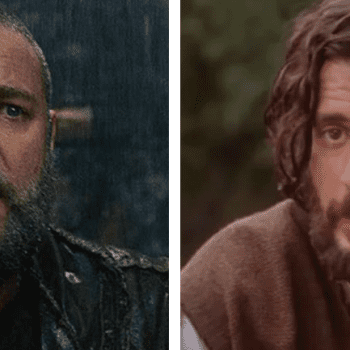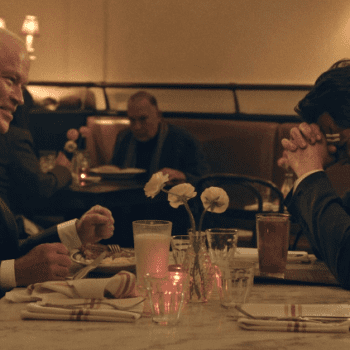
A young friend of mine turned 11 two days ago, and I happened to have a ticket to a preview screening of Madagascar tonight, so of course I took her to see it. And surprise, surprise — we both liked it, quite a bit. (I say “surprise, surprise” because the last DreamWorks cartoon, Shark Tale, put me to sleep. Literally. And that was at a weekend matinee screening.)
I may have liked this film because it was co-directed by Eric Darnell, whose last film was Antz (1998), easily the best Woody Allen movie of the past decade, and a film that I found much more interesting than its Pixar counterpart A Bug’s Life (1998; my review). But I also found the music pretty catchy — both the orchestral Hans Zimmer stuff and the disco-y pop songs — and to my surprise, I found I genuinely cared about the characters, especially Alex the Lion (voiced by Ben Stiller).
There is a scene where he is trapped inside a wooden crate, adrift at sea, and his friends are trapped in crates of their own, and we watch through the knothole with him as the giant waves pull them all apart; I found this scene, with its rising and falling hills of water and its sense of being trapped in such a tightly confined space even as the vastness of the world pulls one’s private space apart, genuinely troubling, albeit in a mild kind of way, and I imagine the effect would have been even more intense if I were a child.
I also found I genuinely cared about the lion when he finds that being in “the wild” has driven him a little mad. And this leads to another reason why I liked the film: it totally plugs into this theme that I’ve been keeping tabs on the last few years, which I like to call “anthropomorphic munchies”. It all began three years ago when I saw The Wild Thornberrys Movie, and I began wondering just how cartoon depictions of carnivorous animals had changed over the years, especially with regard to stories in which these animals are supposed to get along with other animals that, one would think, ought to be their prey. I then began making notes on the subject in this thread, looking at The Lion King (1994), Ice Age (2002), Charlotte’s Web (1973) and similar films new and old.
Madagascar revolves around this theme in a big way. The opening scene is set to the tune of John Barry’s ‘Born Free’, as Marty the Zebra (Chris Rock) leaps across gorges and runs across wide open grassy plains in slow motion. Suddenly Alex the Lion pokes his head out from behind a bush, and he begins to pursue him, also running in slow motion as Barry’s romantic tune continues to play. Is it predator chasing prey? Nope! Turns out Marty was running on a treadmill in a New York City zoo and dreaming of being out in the wild, and Alex is a fellow zoo denizen and friend of his who was just popping by to say “Boo!” and wake him out of his reverie.
After this, as we see the animals do their thing in their controlled urban habitat, there are several gags about Alex’s fondness for the steaks that the zookeepers throw his way. (Like many people who live in the big city, Alex never really has to think about where his meat comes from.) When Marty makes a disparaging comment about steaks, Alex strokes the piece in his hand and says something like, “He doesn’t mean it,” as though he were talking to a lover. Later, we hear Alex talking in his sleep about how he likes something with a bit of meat on it, a bit of fat — and we realize he is talking not about a woman, but about a steak. Later again, there is a scene that parodies the rose-petal fantasy sequence in American Beauty (1999), except this time Alex is dreaming about steaks raining down on him. Steaks have a very sexual appeal to him.
But then, after a series of events leaves him and his friends stranded on a beach in Madagascar, Alex finds that the local pack of lemurs — led by a very wild, crazy, campy king — looks less and less like an audience to him and more and more like a menu. Sex gives way to violence, as Alex’s roar gets unexpectedly stronger, his claws pop out when he isn’t expecting it, and eventually even his former zoomates — including Marty, Melman the Giraffe (David Schwimmer) and Gloria the Hippo (Jada Pinkett Smith) — begin to look like steaks to him. This leads to a sincerely affecting moment where Alex, his mane gone scraggly like the hair on a madman, cowers in a shadow, afraid of his own newfound appetites, while Marty waits outside and promises not to let these recent developments get in the way of their friendship.
Meanwhile, the former zoo animals discover that the wild is full of lethal dangers. They rescue a duck from small land predators and put it in the water, only to watch it get devoured by a giant crocodile. One bird is even devoured by a plant, which burps. And the lemurs, despite their wild-party-animal ways, live in fear of some carnivorous predators known as foosa. Alex is the only zoo animal who scares these foosa, so the big question, of course, is whether he will come to his friends’ rescue once they, too, are attacked by the foosa, or whether he will join in the kill.
Along the way, there are some wiseguy penguins who keep things interesting, and the film’s happy ending has something to do with one of these penguins being adept at making sushi. Apparently fish don’t merit the same respect that other animals do!
It is especially interesting to see that this film addresses the nature of carnivorous behaviour through a lion. One of the ongoing puzzles of my life is actually how a Christian ought to interpret and understand carnivorous animal behaviour, given that Christianity doesn’t think very fondly of death in general and yet the food chain is part of that great design that gives us “the argument from design”. Psalm 104, which is chanted in Orthodox vespers services, tells us that lions “roar for their prey and seek their food from God,” yet Isaiah 11 and 65 suggest that lions will become peaceful vegetarians when the messianic age dawns. These are both rather poetic passages, so it is difficult to say how literally either of them should be understood. OTOH, when Christ conquered death through his resurrection, he proved it by killing and eating fish — so perhaps, as with the film, so with the gospels, and fish can be eaten in place of other, higher lifeforms?












